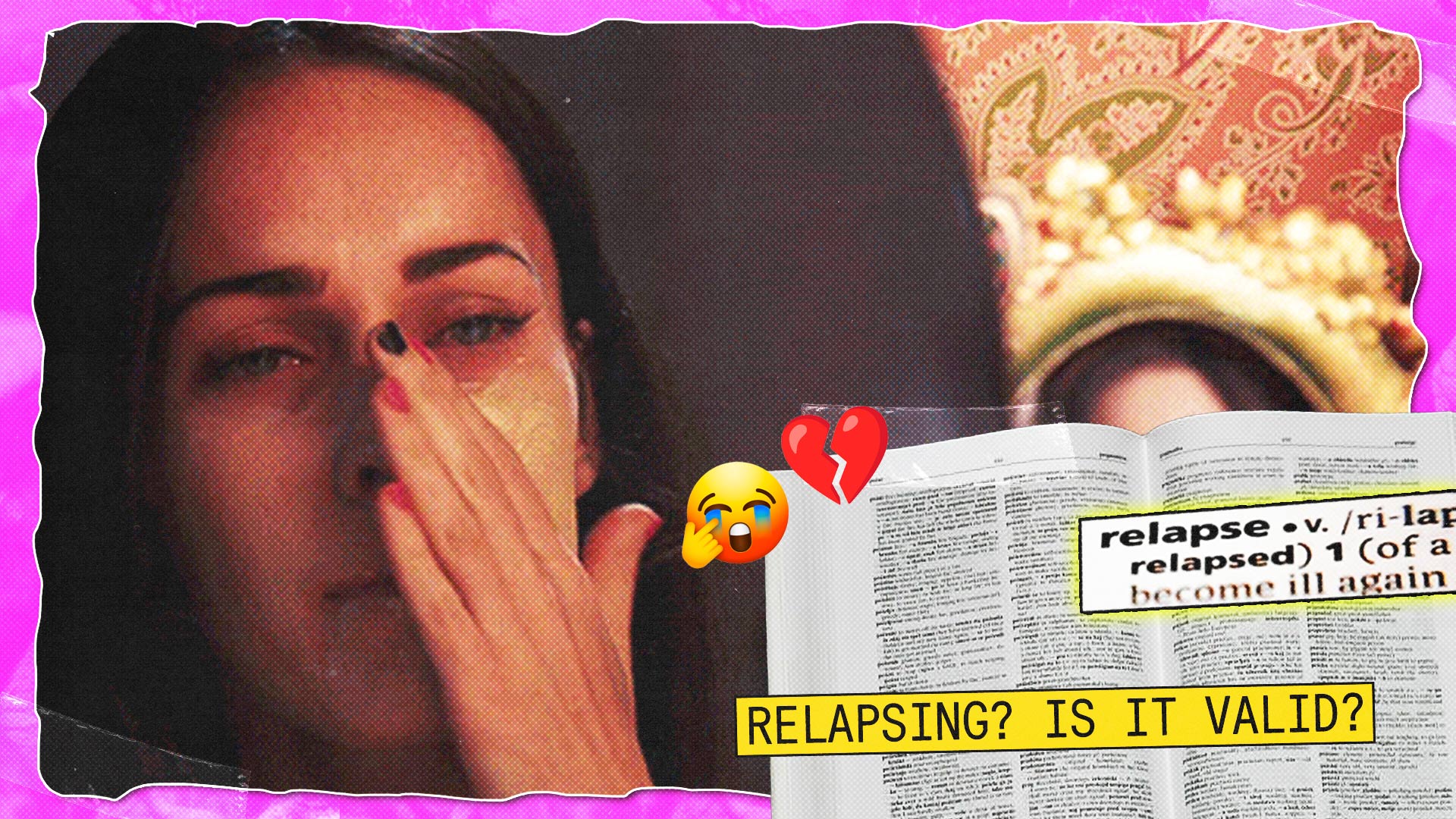Can our abstract emotions be boxed into words?
Related: PSA: It’s Never Ok To Joke About Serious Topics On TV
Trigger Warning: This story has mentions of mental illness and substance addiction
Ever come across posts on the internet where people document themselves as they tell tales about “relapsing” while referring to an old flame? Recently, the internet has reclaimed a new buzzword that has been making rounds on social media platforms, possibly carrying multiple different meanings.
The most contemporary definition of a “relapse” you will probably stumble across on social media is that it is a result of missing a lover from the past or a memory incorporated with them. Reciprocated or not, it carries the same intensity of a panoramic flush of memories. It could be in the form of a TikTok video, or an X thread about a loved one they thought had been long forgotten. Their “relapse” happens whenever they stumble across a thing that was once associated with their former lover. In words and tunes, scents and motion, there will always be one element that will carry you back in the past, heavy and haunted.
The question is, is this love-transfixed generation misusing the word “relapsing” too far from its origins?
Technicals Of Relapsing
The internet’s meaning of relapse doesn’t stray too far from its actual definition. However, it still carries a much lighter connotation compared to the original. Relapsing was initially related to mental illness and substance addiction. It is the backtracking to any toxic behavior or habit that once took a toll on how a person behaves and functions as a member of society.
In a more technical aspect, relapsing happens when a person who was already sober goes back to their old ways with lesser intentions of recovering. However, it is crucial to keep in mind that relapsing does not equate to failure. Missing a beat in recovery does not mean that it is farfetched and impossible. This just means that there must be something in the recovery process that requires a revision. There will always be room for healing.
Fine Line Between Relapsing and Reminiscing
Some netizens have expressed their opinions on how the word “relapsing” has been co-opted by a certain section of social media to mean something it wasn’t originally intended for.
Friendly reminder that the word "relapse" isn't about you reminiscing what you had with your ex-partner before. It is a word often used for people with addiction (e.g drugs, drinking alcohol, etc.) who happens to stop doing it, but found themselves using again, (1/2)
— but noypi struggles 🤸🤸 (@pakekobutpinoy) October 12, 2023
It has become a constant battle of boxing emotions into either relapsing or reminiscing. With netizens calling out the misuse of the word, there’s an ongoing online debate on whether it is acceptable to alter definitions of such terms.
Actually, it is a bit harmful kasi this term is used for clinical and medical purposes din. The reason na coin and term is for easy and fast diagnosis kasi may term na agad na nagagamit to describe the symptoms. Imagine if you say "Nag relapse ako" to a Psychologist or (1)… https://t.co/ktvWZOnXgN
— Renjun//Offgun (@DreamHighNCT) October 13, 2023
relapse ≠ reminisce
— katleya (@inniesamericano) October 13, 2023
in simpler terms, relapse is when you get better, finally feel better, but then suddenly, for some reason or trigger, you spiral back down to where you first started. whereas reminisce is to remember memories.
Just a friendly reminder that "relapse" isn't about reminiscing with your ex-partner. It's a term commonly used for individuals with addiction who have stopped but then find themselves using again. It's important to use words accurately to avoid confusion.
— JUNIO 🍥 (@0506pewiqu) October 13, 2023
With “relapsing” taking on a new association with love and breakups, it could be hard to draw the line between relating destructive habits to it and completely altering its definition.
Still, we must keep in mind the clear distinction between these two terms. “Reminisce” falls under more lighthearted throwbacks than the weight of the word “relapse.” One more thing to keep in mind with handling strong terms like relapsing is to acknowledge that some people actually suffer severe consequences for doing so.
Compensating With Time
While it’s important to use the correct terms when referring to certain topics, especially of the sensitive kind, that doesn’t mean we should invalidate what other people feel. To some, “relapsing” in a romantic sense does carry an intense array of meanings to it, especially how it is closely related to mental health, and they deserve a safe space where their pain and vulnerability are seen and validated.
Clinical psychologist in NYC specializing in psychotherapy Suzanne Lachmann defines relationship relapse as “giving in to withdrawal […] It’s your way of staving off the pain of acknowledging that the relationship is no longer viable. You are doing everything in your power to buy time now so you don’t have to face the pain.”
Grief from love, reciprocated or not, is real and it connotes a certain spectrum of pain. Looking back in love and coming to terms with the fact that it can never be relived again is deteriorating. It could take a long and excruciating period of time to be able to get over grief and trauma from something that once caused you genuine happiness. Pain inclined with love is one of the most stinging experiences a human can ever go through, and boxing certain terms for only specific struggles is not a progressive way forward.
On Offsets And Validity
The key here is to approach the subject without invalidating such emotions from both sides. While it is human nature to hurt and wallow in the heights of emotions, it can also be valid to call out the “watering down” of terms that bear definitions of life and overall function for the affected community.
What we ought to do is be sensitive, empathetic, and kind to everyone, as we all carry different weights of pain and emotional turmoils. Standing up for one’s belief, as long as it’s moral and ethical, is commendable. But the best way to go about this is to compensate and accept that our differences and spectacles of stories paint the picture of raw humanity.
Destigmatizing mental health discourse, especially in the Philippines, starts with letting everyone know that feelings are absolutely valid. And there is no way a single online debate about the ever-evolving nature of language could stop this growth and enlightenment.
Continue Reading: 7 Ways You Can Support Your Friend Who Is Struggling Mentally





